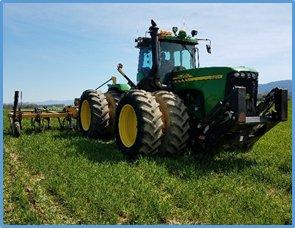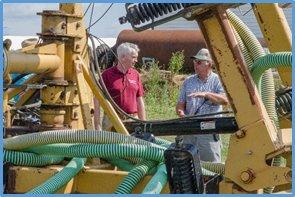EPA-Funded Technology Seen as Win-Win on Virginia Farm
Stories of Progress in Achieving Healthy Waters
EPA Region 3 Water Protection Division
Port Republic, Virginia - December 2018
A Virginia farmer is finding that an innovative device to apply manure from dairy operations to cropland is good for his business and good for air and water quality.
With the help of Dr. Rory Maguire of Virginia Tech, Nelson Rodes and his sons used funding from an EPA-financed National Fish and Wildlife Foundation (NFWF) grant to buy a “drag hose manure injection” system that has made a big difference on their Riverhill Farm in the Shenandoah Valley community of Port Republic, Virginia.
 A drag hose is an alternative manure application system that has advantages for farms with a large amount of manure to spread. The system involves an irrigation pump that sends the manure to a tractor through a flexible hose. The tractor pulls the hose and a manure injection device places the liquid manure below the soil surface.
A drag hose is an alternative manure application system that has advantages for farms with a large amount of manure to spread. The system involves an irrigation pump that sends the manure to a tractor through a flexible hose. The tractor pulls the hose and a manure injection device places the liquid manure below the soil surface.
Drag hose system in action.
Photo Credit: Sustainable Chesapeake, Kromatic Media
The effort at Riverhill Farm is connected to the broader Chesapeake Basin Subsurface Application of Manure (SAM) Initiative.
 The drag hose manure injection system has improved soil health, minimized the trampling of cropland that would have occurred with heavy tanker-spreaders or injectors, cut fertilizer costs by providing twice-as-much plant-available nitrogen, and reduced manure odors.
The drag hose manure injection system has improved soil health, minimized the trampling of cropland that would have occurred with heavy tanker-spreaders or injectors, cut fertilizer costs by providing twice-as-much plant-available nitrogen, and reduced manure odors.
Dr. Maguire (left) and Nelson Rodes discuss
the benefits of the system.
Photo Credit: Sustainable Chesapeake, Kromatic Media
Crawford Patterson of the Virginia Department of Conservation and Recreation has been working with the Rodes family to develop the farm’s nutrient management plan. In a publication of the Virginia Nutrient Management Leadership Team, he stated, “manure injection gets you to where you can raise your crop without any additional nitrogen application, which saves farmers money and benefits the environment.”
EPA funds projects like this one with NFWF that allow farmers to work with land grant universities to try out new technologies
